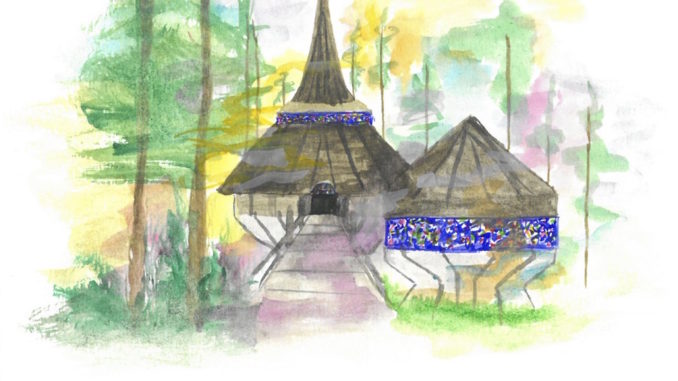
By Mado Hayes
Despite Lewis & Clark’s large population of non-religious students, there is still a diverse range of faith on campus that is expressed and practiced in many different ways. The LC Office of Spiritual Life supports a variety of groups, including Spiritual Que(e)ry, which is a group for LGBTQ students; Hillel, a Jewish group; Common Ground, which is an earth-based spirituality group that will start back up next semester; a Buddhist group and several other organizations. These groups host events that are open to all students, regardless of religious affiliation.
Dean of Spiritual Life Mark Duntley said that the Office of Spiritual Life was put together to serve a wide range of spiritual interests.
“The whole idea behind this office is that as students develop academically and intellectually and mature, there is also a spiritual component that a lot of people are interested in developing and growing in,” Duntley said. “I think that spiritual component can be interpreted in many different ways.”
Margarete Maneker ’21, who is involved with Hillel and has been working with two other students to bring back Common Ground next semester, said that there is an emphasis on community in the groups she has been involved in.
“The Jewish groups on campus are much more geared towards the Jewish community as opposed to a religious standpoint,” Maneker said. “Especially in light of recent events (Tree of Life Synagogue shooting), I think it’s important to know that you have a community behind you of your peers.”
Some religious students at LC have a hard time finding a sense of community on campus. Lulu Alas-Viana ’19, who is a practicing Catholic student, said that she felt lonely when she first came to LC since there were so few Catholic students. She attends church off campus at a Catholic parish in Lake Oswego.
“Being part of that community over there has really helped me strengthen my faith,” Alas-Viana said. “But also being here at LC helped me strengthen it more because there are people who ask me questions about my faith.”
Alas-Viana said that she is open to talking to others about Catholicism and her faith, but she worries about making people feel uncomfortable.
“If you have questions, I’ll answer them, or if you feel uncomfortable with me talking about my faith, let me know and I won’t,” Alas-Viana said.
Jaime Monsher ’20, who is a Jewish student, said that they see religion expressed at LC through culture and clothing, rather than through traditional practice.
“(Religion) is more of a personal thing,” Monsher said. “I don’t engage in it a lot, which is why I personally wear my yarmulke because it’s a reminder to myself.”
Amatullah Aman ’21, who is a Muslim student, said it is difficult to express her religion at LC because of the politics surrounding Islam.
“I feel like here (at LC) acknowledging my religion is more like a political stance than a proclamation of faith,” Aman said. “Which is why I don’t wear the hijab on campus. I don’t feel comfortable with people politicizing my relationship to God, and I don’t want to consistently be the sole representative of a religion that encompasses billions across the world. I don’t have that choice with being black, or a woman, so with the one thing I can withhold, I will. LC loves the concept of Muslims without the ideology that comes with Islam.”
In an effort to better accommodate religious students on campus, in the fall of 2014 Watzek Library designated a place in the northeast corner of the second floor of the library to serve those for whom prayer is part of their daily routine.
“The prayer space is non-denominational and available to any member of our community for whom this may be a need,” Science & Data Services Librarian Parvaneh Abbaspour said over email.
Rasha Albulayhid, a Muslim student from Saudi Arabia who came to LC to do Academic English Studies, uses the prayer space frequently.
“My friend Amal and I were praying in a corner in the Writing Center in the whole spring semester,” Albulayhid said. “After that we realized that they allocated a place for us to pray and they wrote ‘Please be respectful of students who use this area to pray’ and put all the stuff that we need to pray, which I really appreciate.”
LC also presents the opportunity for students to engage with religion through academics. Brett Wilson ’19, who is an agnostic Religious Studies major, reflected on the role of religion in her life since coming to college.
“I think that critically thinking about religion and the role that it plays historically, politically and personally in people’s lives is really valuable, and that it should be thought about regardless of beliefs,” Wilson said.
Duntley encourages students who are not religious or spiritual to at least have an open mind toward the ideas of religion and spirituality, and to be curious rather than dismissive of these ideas.
“You might learn something interesting about your own life by looking at someone else’s life who’s different,” Duntley said. “Isn’t that why we value diversity in the first place? It provides us with an opportunity to understand someone else and maybe then ourselves a little better.”
Subscribe to the Mossy Log Newsletter
Stay up to date with the goings-on at Lewis & Clark! Get the top stories or your favorite section delivered to your inbox whenever we release a new issue.

Leave a Reply